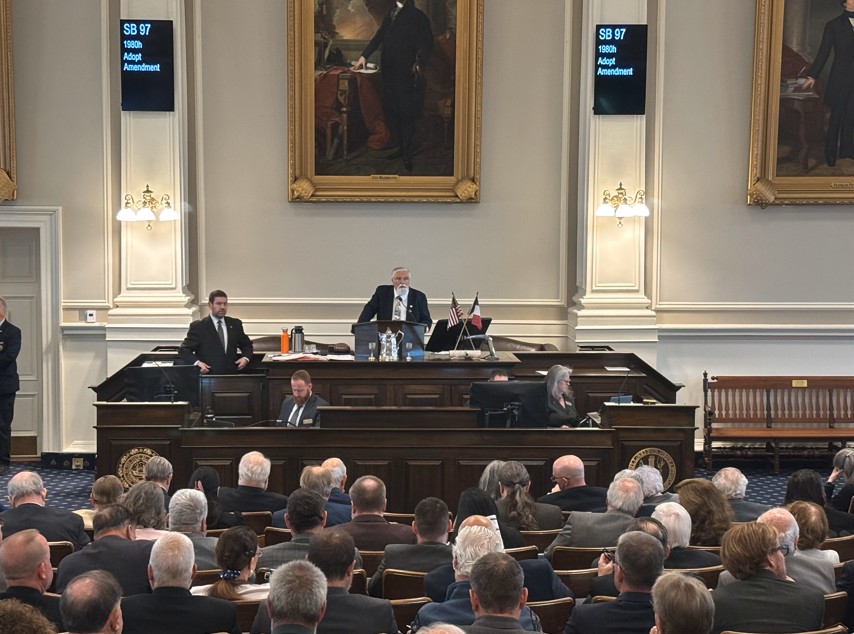By GARRY RAYNO, InDepthNH.org
CONCORD — New Hampshire would no longer recognize driver’s licenses or driver privilege cards issued to asylum seekers by other states until they obtain a green card under a bill passed by the House Thursday.
The state does not issue driver’s licenses to undocumented immigrants, although some other states do with Connecticut the only state in New England that does.
Senate Bill 13 would not allow undocumented immigrants with licenses from other states to operate legally in New Hampshire and would also prohibit police from initiating a traffic stop on that suspicion alone.
Bill opponents said the bill would take away driving privileges of people who are legally in this country with many working until they become legal residents, which would take away their ability to work and support a family.
They said the bill sends the wrong message and the clear message is “you are not wanted here” although the federal government has already determined you are an asylum seeker who is eventually eligible for a green card.
“They are lawfully present in the United States,” said Rep. Daniel Veilleux, D-Amherst. “That is not a loophole, that is the law.”
Rep. Seth Miller, D-Dover, said, “When I was a teenager, my mother reminded me life is not fair and I continue to wonder what is fair.”
If you are here legally, you can hold down a job, he noted, but in New Hampshire to have a job you have to drive a car to get to work.
“If you no longer have a job here, who does that benefit,” Miller said. “Not the business owner who loses a worker, not the local shop owner who loses a customer.”
When you lose the ability to work, you lose the right to live, thrive and survive in your community, he said.
“As we play God with their lives, let us choose to play the humble, compassionate, generous, welcoming and even perhaps the economically sound version of that role,” Miller said, “not the one this bill represents.”
But Rep. Thomas Walsh, R-Hooksett, noted the House has debated this now for the third time, and said millions of immigrants crossed the border almost all claiming to seek asylum, although nine out of 10 were illegitimate claims.
“This only puts the brake on who we give out driver’s licenses to,” Walsh said. “If you lose your case, you get deported. Giving that privilege (to drive) puts the cart before the horse.”
The bill passed on a 192-164 vote and goes back to the Senate because of changes the House made to the bill.
Housing
The House tabled two bills called key to the Housing Committee’s push for statewide zoning and planning regulations it believes will help spur more residential building and affordable housing to begin addressing the state’s long brewing housing crisis.
But opponents to the bills say they make wholesale changes to systems that have been constructed over time to reflect the residents’ wishes and visions for their local communities.
They said the one-size-fits-all approach does not take into consideration towns’ and cities’ unique character and potential limitations on land use such as high water tables or sand type.
House Bill 170 would prohibit communities from imposing occupancy restrictions, allow underground utilities in open space and buffer zones, and require planning boards to recommend in writing plan changes for developers and if they agree, automatic approval would have to be granted.
“Together, these reforms aim to reduce arbitrary regulatory delays, promote fair housing access, and encourage more efficient, cost-effective development throughout the state,” said Rep. Brian Cole, R-Manchester.
But opponents called the bills an assault on local control that ignores environmental issues and a community’s self determination.
House Bill 174 would prohibit planning boards from considering the number of bedrooms in a unit or development during the hearing and approval process.
School Transfer
The House approved a bill that would allow parents to transfer their student to another school within the school district if they believe it would be a better fit for their child.
Senate Bill 97 also would require superintendents to approve transfers to schools outside the child’s district unless other requirements are met.
Rep. Glenn Cordelli, R-Tuftonboro, said, “The best place for a student is up to the parents, not the superintendent.”
He said the bill is about the best interest of the child.
“A child’s education should not be dictated by some arbitrary boundary,” he said. “It is time to open the schoolhouse doors so every child gets the best education for them.
“Remember the game ‘Mother may I? Now we play ‘Superintendent may I’ and we’re changing (that) to ‘parents may.’”
But opponents said the bill would exacerbate the divide among students, make budgeting and planning a nightmare for administrators, while students and taxpayers will bear the burden for a privileged few.
“Those who face education disadvantages will be left further behind,” said Rep. Muriel Hall, D-Bedford.
The bill passed on a 199-165 vote and will go back to the Senate due to changes the House made.
Prostitution
The House passed Senate 267, which would penalize the patron who pays for sex with a prostitute. The person would be fined $500.
The bill now goes to the governor.
No Profit
The House also passed Senate Bill 148, which prohibits a convicted murderer from profiting from his or her crime.
The bill goes back to the Senate because of a change the House made.
Garry Rayno may be reached at garry.rayno@yahoo.com.





